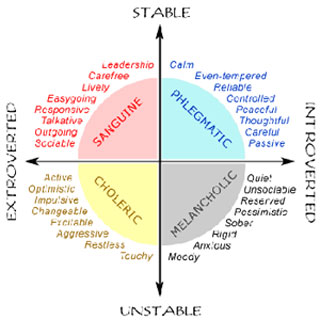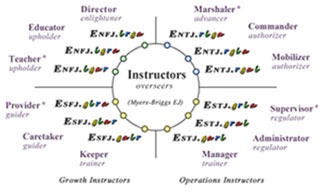As we continue identifying the personality of temperaments. We will now discuss the remaining melancholic and phlegmatic individuals.
The Melancholic
Melancholic individuals are typically self-conscious, easily embarrassed, and may be timid, or bashful.
They may perhaps be confident, yet reclusive. They avoid talking before groups; when obliged to, they find it difficult.
They are attentive to details and very careful. Melancholics are deliberative and slow in making decisions; perhaps, overcautious even in minor matters.
In the realm of relationships, they tend to be detached from their environment, and reserved and distant except with intimate friends. They incline towards depression, and are frequently moody or gloomy. They are very sensitive and easily hurt.

They do not form acquaintances readily; they prefer a narrow range of friends, and tend to exclude others. Melancholics do not feel at home among crowds for any length of time, and they love silence and solitude.
People close to melancholics must understand these needs and not feel offended by them.
Their serious view of life, love of solitude, and inclination to reflection are a great help in acquiring the interior life of prayer. In the area of personal improvement, they spend too much time worrying over possible misfortune and crossing bridges before they come to them.
They are secretive, reclusive, and not inclined to speak unless spoken to. They need to make more effort to improve their communication skills and to share themselves with the people around them.
In the training of melancholic children, special care must be taken to always be kind and friendly, and to encourage and keep them busy.
The Phlegmatic

People with a predominant phlegmatic temperament are deliberative, slow in making decisions, and over cautious in minor matters.
They are usually indifferent to external affairs, having very little interest in what is going on around them, and they are reserved and distant. They are slow in movement, but have a marked tendency to persevere and are usually appreciated for their constancy of mood.
Phlegmatic persons are not at all, or only weakly, touched by those trying to make impressions. Their reaction is feeble or entirely missing, and those impressions that are made fade away very quickly. They aren’t easily exasperated by offenses, or by failure or suffering.
Training phlegmatic children is very difficult, because external influence has little effect on them and inner personal motives are lacking.
It is necessary to explain everything in the most minute detail to them, and repeat it again and again, so that at least some lasting impression can be made, and to accustom them, with patience and clarity, to strictly following a well-planned life.
Phlegmatic types have a quiet will of iron. They may seem quiet and “pushovers” at times, but they can turn into a wall when pushed against their will. They may resist change and appear lazy at times, and they may not be the most exciting people to be around.
However, they are kind and easy to get along with, inoffensive, they spend time with their friends and family, are good listeners, show compassion and concern, and do not get upset easily.
Phlegmatics are often unappreciated since they do not provide the “glitter” and “glamour” that attracts a lot of people, but they are usually appreciated by friends and family who know they can be depended on. In their spiritual pursuits, they may not exceed; yet, they will be steady.
This article was first published in 2011 and is currently republished for its importance.
References:
- Chisti, Hakim G.M., N.D. The Traditional Healer’s Handbook: A Classic Guide to the Medicine of Avicenna
- Thomson, John. Natural Childhood. Keirsey, David. Please Understand Me II.
- Littaner, Florence. Personality Plus.
- Between Heaven and Earth Chinese Medicine
- Complete Herbal and English Physician
Other Sources:
- Childhood: The Study of the Growing Soul
- Spock, Marjorie. Teaching as a Lively Art.
